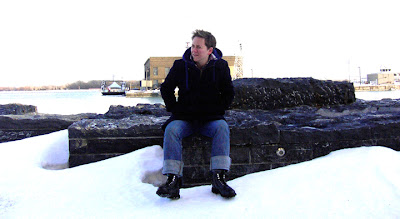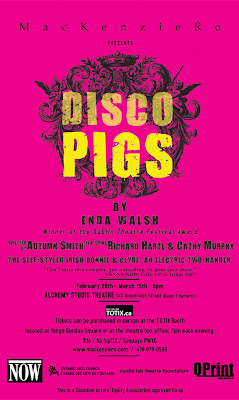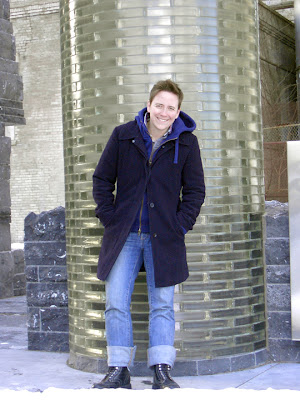 1) What the fuck is going on?
1) What the fuck is going on?
21-year-old Bushmills; Curb Your Enthusiasm – Season 6; and my upcoming tickets to Flogging Molly (Toronto) and The Pogues – Shane MacGowan is still breathing – fuck yeah! (Boston).
In between, working on Disco Pigs (MacKenzieRo) and The Rake’s Progress: Do You Know Where Tom Rakewell Is? (Equity Showcase Theatre Artists’ Showcase).
2) Why have you chosen to remount your 2007 Toronto Fringe Festival production of Disco Pigs?
It is by far the most challenging and stimulating play I have ever worked on. I wanted another go at it to develop it even further. I had some unanswered questions at the end of the last run that I wanted to tease out. Now, of course, I will have a bundle of new unanswered questions.
Disco Pigs gives us characters that are spontaneous, mad, full of violent creativity and audacity—and it makes us ache for them. At the Fringe, we had such an immediate reaction to the work that I wanted to bring it to a wider audience.
Part of the audience we are hoping to reach this time around is a youth audience. To me, the play is punk-poetry. Disco Pigs invokes what it is like to live apart. It uses the language of the mainstream and then fills it with slang and obscurity. We cannot wait to see how teens respond.
And finally, I am re-mounting because I wanted to add in a Ramones song.
 3) What is pub theatre?
3) What is pub theatre?
Really, simply put, theatre in a pub. In the UK and Ireland, pub theatres tend to have one resident company (usually indie). The theatre space is a well-appointed black-box often on the second floor of the pub. Productions frequently transfer out to other venues after initial runs. Many of Conor McPherson’s plays debuted in pubs.
Historically, The Public House has acted as the centre of the community. This was a meeting place for the people. With its gritty, sawdust coated floors, The Public House gathered local voices in a shared space.
Ideas and performances are exchanged in this dynamic intersection of theatre and community.
4) What can Canadian theatre makers learn from our contemporaries who are doing it well in Ireland and the United Kingdom?
As MacKenzieRo develops its mandate further, we are finding ourselves more and more drawn to the in-yer-face playwrights from Ireland. Canada certainly has many writers who know how to handle this genre. I think we at MacKenzieRo are compelled by the Irish works because of the heritage of our founding members. What I’ve learned as a Canadian theatre maker from Disco Pigs and Walsh in particular, is that theatre should never compromise, and that there should be a holocaust on complacency.
5) Do you have any unifying theories that inform your approach to directing actors?
No theories in particular, although I am pretty keen on the Uta Hagen specificity-driven exercises.
 6) How do you feel about your time at the Oxford School of Drama?
6) How do you feel about your time at the Oxford School of Drama?
It was an invaluable conservatory experience. David Silby from Out of Joint Theatre made a real impact. He brought a contemporary vision to the studio which urged me to question my preconceptions about classical works. I was also introduced to Complicite’s work when I was in the conservatory in 1997. This re-arranged my cell structure. I am still informed by it.
7) How would you describe the organizational structure of your theatre company, MacKenzieRo?
Cathy Murphy and I, the founding members, choose the plays. We have been operating in the co-op structure. In this sense, each time a play is chosen, the cast and creative team form a co-op with Cathy and I. Really though, it is all pretty traditional and straightforward. I direct. The actors act. Cathy and I co-produce. Other co-op members share duties re publicity, etc. etc. etc. We are a true indie company.
8) How important is it for artists to be actively challenging systems of oppression with their work?
Very important if the work is well written and executed—it better be stimulating, rousing and refreshing. Not important at all if the work is merely a vehicle for a rant and a wank.
 9) Do you have a favourite theatre-related quote?
9) Do you have a favourite theatre-related quote?
“After a rare snowfall in Florence, Piero de Medici is alleged to have commissioned Michelangelo to make a sculpture in snow. It was said to have been his greatest work, but you had to have been there to have seen it—it was as frail and as ephemeral as a theatre performance, living on only in the memory.” Richard Eyre
10) If you could change just one thing about theatre in Toronto, what would it be?
The select but influential artists and administrators who are refusing the voices of anything deemed non-Canadian—and it is fascinating what gets tossed into this category.
I love the idea of pub theatre. A great way to put “a theatre in every neighbourhood,” as Daniel MacIvor says.
Does Pub Theatre tend have shorter production cycles than “regular” theatre?
Pub theatre – that is a wonderful idea. Great arena for short plays and sketch comedy – built-in, well lubricated audience, easily obtained feedback…I love it. Are there any actor-centric bars in TO? We had one here for a while that went south pretty quickly due to abominable service, but this idea would have sung there. Another idea for the pile…